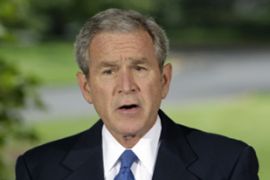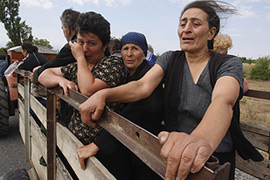US condemns ‘Russian aggression’
Bush says violence in Georgia “unacceptable” while Cheney says it “must not go unanswered”.

Bush’s vice-president, Dick Cheney, on Sunday called Mikheil Saakashvili, the Georgian president, to offer US backing in the face of what he called a threat to Georgia’s sovereignty and territorial integrity.
“Russian aggression must not go unanswered, and … its continuation would have serious consequences for its relations with the United States, as well as the broader international community,” Cheney’s office said in a statement.
Cheney’s remarks came as Georgia accused Russia of bombing a military base and radar installation near its capital, Tbilisi, after the Georgian government had offered Moscow a ceasefire and peace talks.
War of words
On Sunday Russian and American envoys to the United Nations exchanged sharp remarks over the escalating conflict.
 |
| Thousands have fled their homes because of the conflict [Reuters] |
Zalmay Khalilzad, the US ambassador, accused Moscow of seeking “regime change” in Georgia and resisting attempts to make peace after days of deadly fighting.
“Is your government’s objective regime change in Georgia, the overthrow of the democratically elected government of Georgia?” Khalilzad asked Vitaly Churkin, the Russian ambassador.
He said the days of overthrowing leaders by military means in Europe were gone and that Russia’s nostalgia about the past was being reflected in the present conflict.
Churkin’s replied that “regime change is an American expression. We do not use such an expression”.
But he added: “But sometimes there are occasions, and we know from history, that there are different leaders who come to power, either democratically or semi-democratically, and they become an obstacle.”
The current Security Council president, the Belgian ambassador, confirmed there were initiatives by the US and France which, if passed, would allow the council to take a formal stand on the fighting in Georgia.
Al Jazeera’s UN correspondent, John Terrett, said the argument between Russia and the US was reminiscent of the old days of the Cold War, and that the American and French draft resolutions will have to contain wording acceptable to Russia, or they would be vetoed.
Mediation attempt
Mediators have begun a mission to end the internationally condemned fighting in the Caucasus region.
Bernard Kouchner, the French foreign minister, on Sunday met Saakashvili in
Tbilisi to push a European Union-backed peace plan aimed at defusing the conflict.
The plan calls for an immediate ceasefire, medical access to victims, controlled withdrawals of troops on both sides and eventual political talks, Kouchner told journalists after the meeting.
“Our task is clear… We must find the means for an immediate ceasefire, accepted by both sides,” Kouchner said. “We must talk about negotiations and a political solution, there is no military solution.
“We must move quickly, this is not a diplomatic exercise, it’s an exercise of survival.”
Kouchner was to travel to Moscow on Monday where he hoped to meet Dmitry Medvedev, the Russian president.
South Ossetia, and the region of Abkhazia, split away from Georgia after fighting in the early 1990s and have run their own affairs without international recognition since.
The two separatist provinces have close ties with Moscow, while Georgia has deeply angered Russia by wanting to join Nato.
Georgia, whose troops have been trained by American soldiers, began an offensive to regain control over South Ossetia overnight on Friday, launching heavy rocket and artillery fire and air strikes that pounded the regional capital Tskhinvali.
Georgia says it was responding to attacks by separatists.
In response, Russia launched artillery shelling and air attacks on Georgian troops and entered South Ossetia to repel Georgia’s attempt to retake the province.